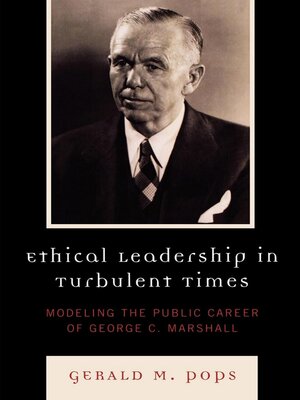Ethical Leadership in Turbulent Times
ebook ∣ Modeling the Public Career of George C. Marshall
By Gerald M. Pops

Sign up to save your library
With an OverDrive account, you can save your favorite libraries for at-a-glance information about availability. Find out more about OverDrive accounts.
Find this title in Libby, the library reading app by OverDrive.



Search for a digital library with this title
Title found at these libraries:
| Library Name | Distance |
|---|---|
| Loading... |
In Ethical Leadership in Turbulent Times, leadership and organizational theory are blended with early 20th Century history to model public leadership that is both monumentally effective and classically ethical. What is leadership? What makes leadership good or bad? To answer these questions, Gerald M. Pops draws on the multi-faceted career of George C. Marshall as an extended case study, focusing on the timely subject of leadership in public service.
The dominating traits of Marshall's career were his character, virtues, and ethical practices in two world wars, his efforts to keep the peace and promote economic recovery following World War II, his style of management, and his approach to international diplomacy and nation-building. Pops shows how Marshall's leadership was unique, given the ethical qualities displayed in his character and instilled in the organizations he led. All of these are examined in the context of his long career, and related to an abundant body of leadership theory, in order to successfully present Marshall as an effective public leader not only of the military and political realms, but of business and society as well. This makes the book ideal for students and scholars in the fields of political science, public administration, and the burgeoning field of leadership studies. It is also a fascinating read for all those with a love of twentieth century and military history.
The dominating traits of Marshall's career were his character, virtues, and ethical practices in two world wars, his efforts to keep the peace and promote economic recovery following World War II, his style of management, and his approach to international diplomacy and nation-building. Pops shows how Marshall's leadership was unique, given the ethical qualities displayed in his character and instilled in the organizations he led. All of these are examined in the context of his long career, and related to an abundant body of leadership theory, in order to successfully present Marshall as an effective public leader not only of the military and political realms, but of business and society as well. This makes the book ideal for students and scholars in the fields of political science, public administration, and the burgeoning field of leadership studies. It is also a fascinating read for all those with a love of twentieth century and military history.







